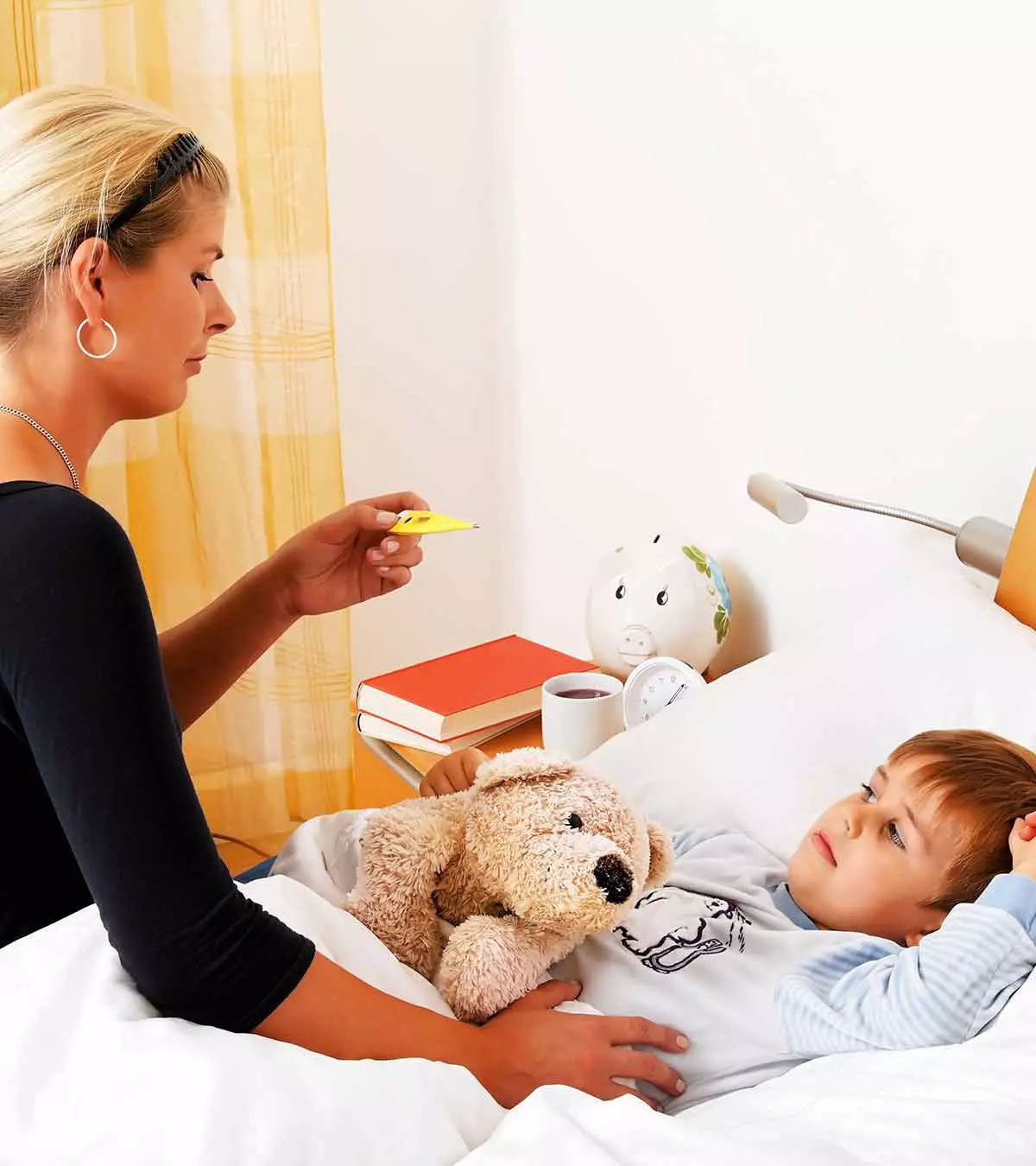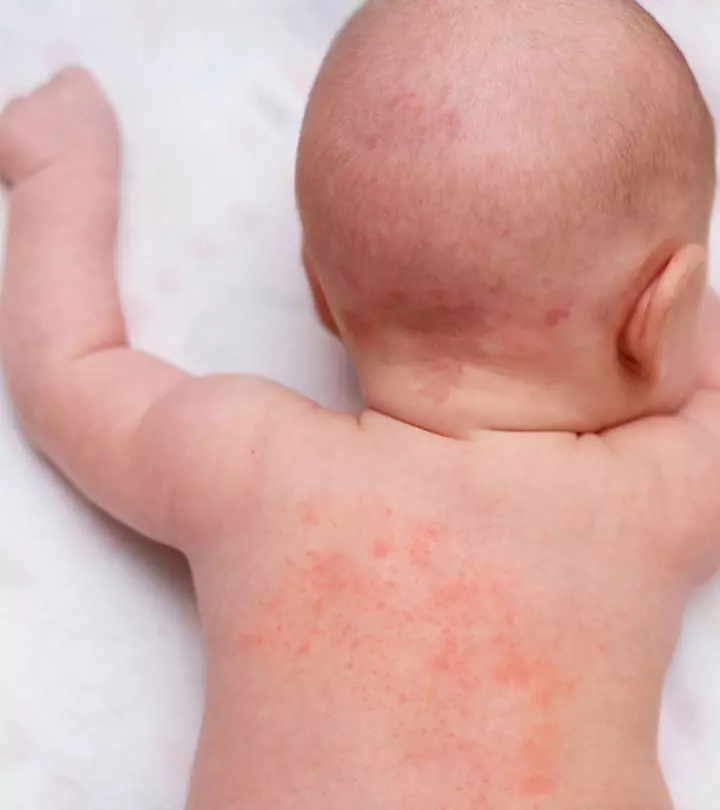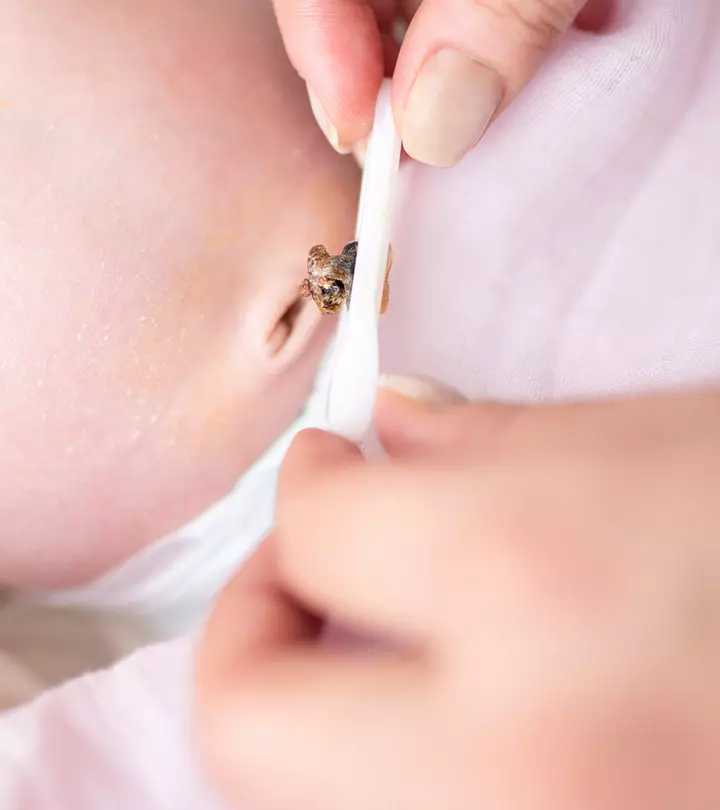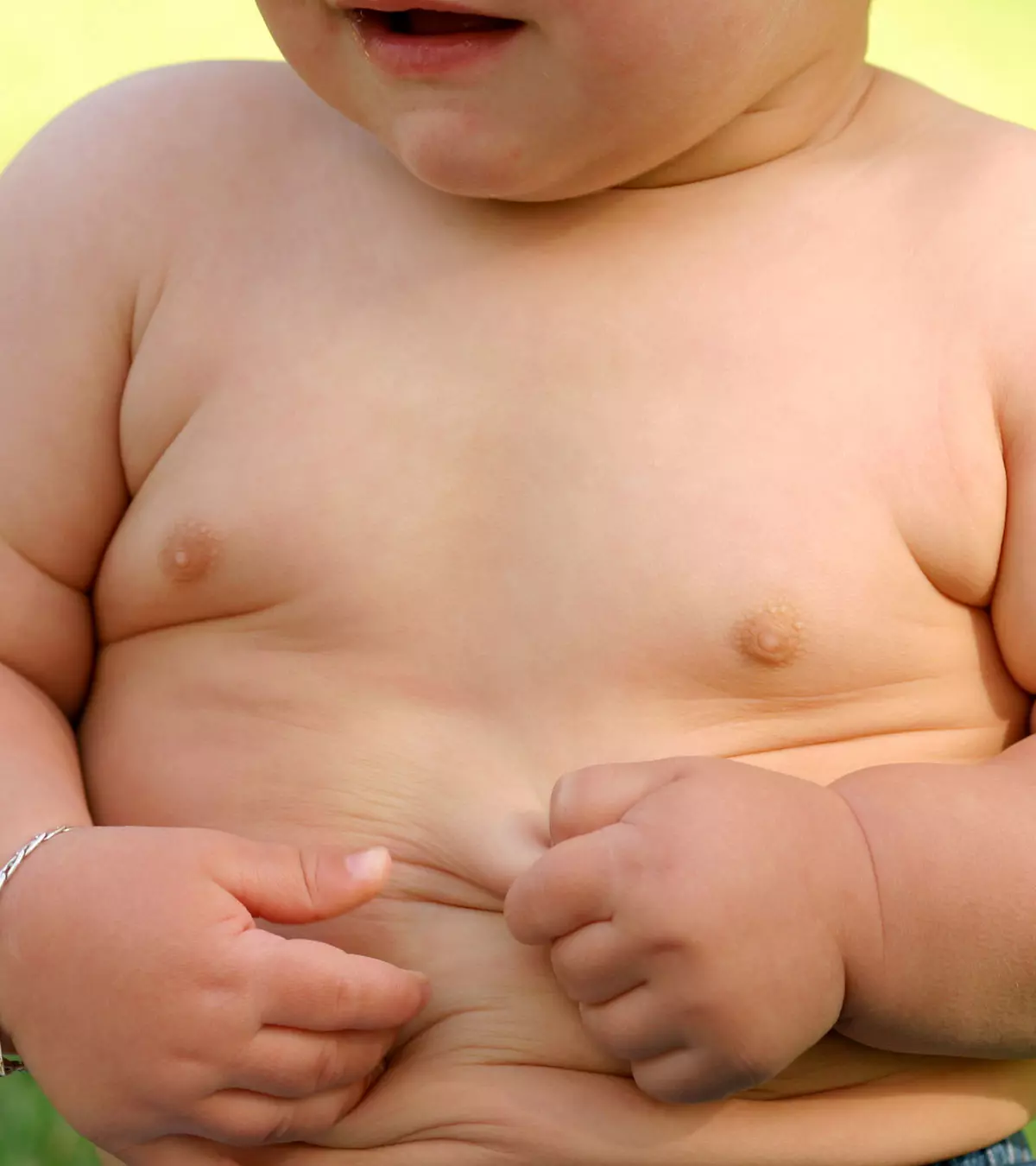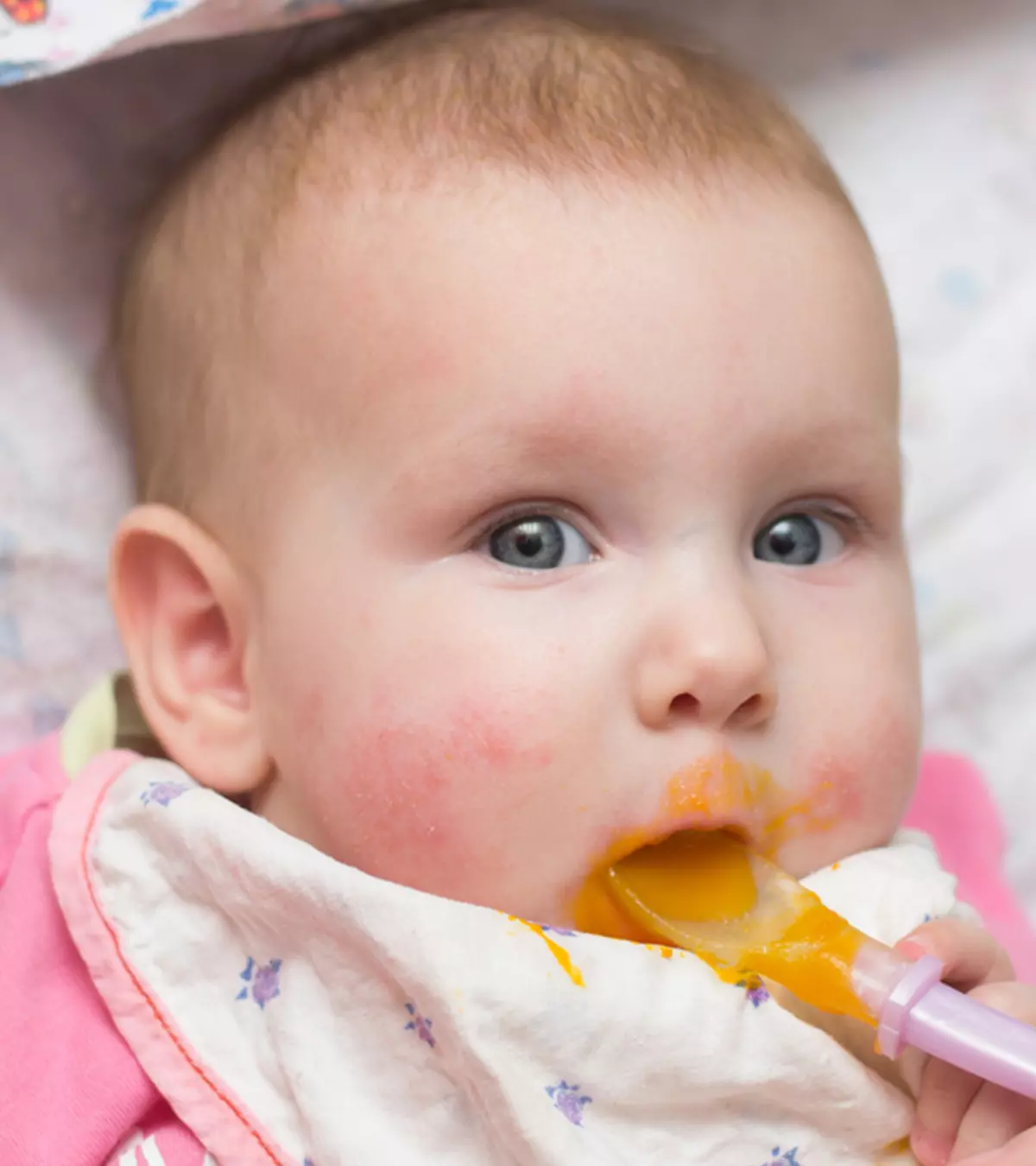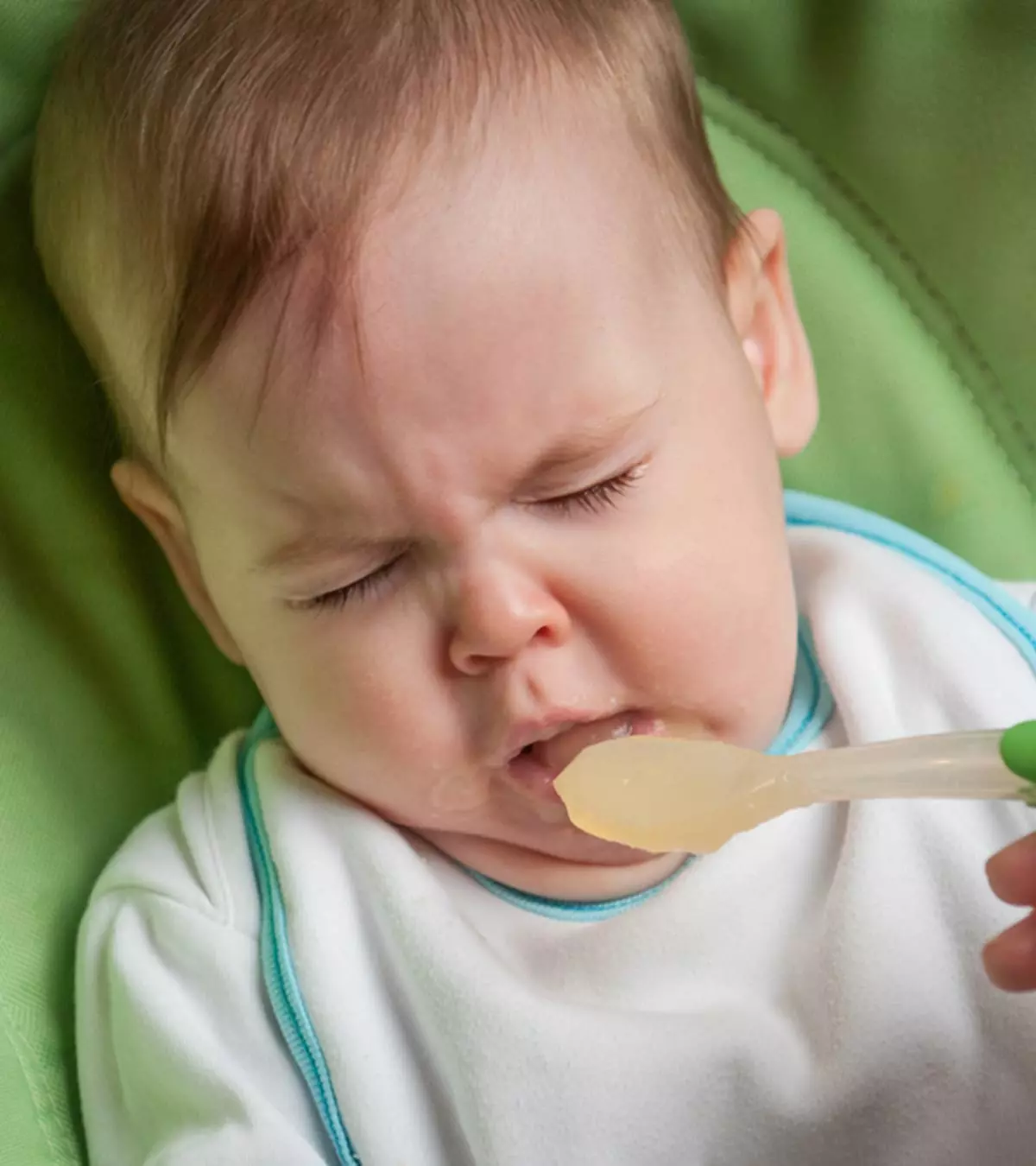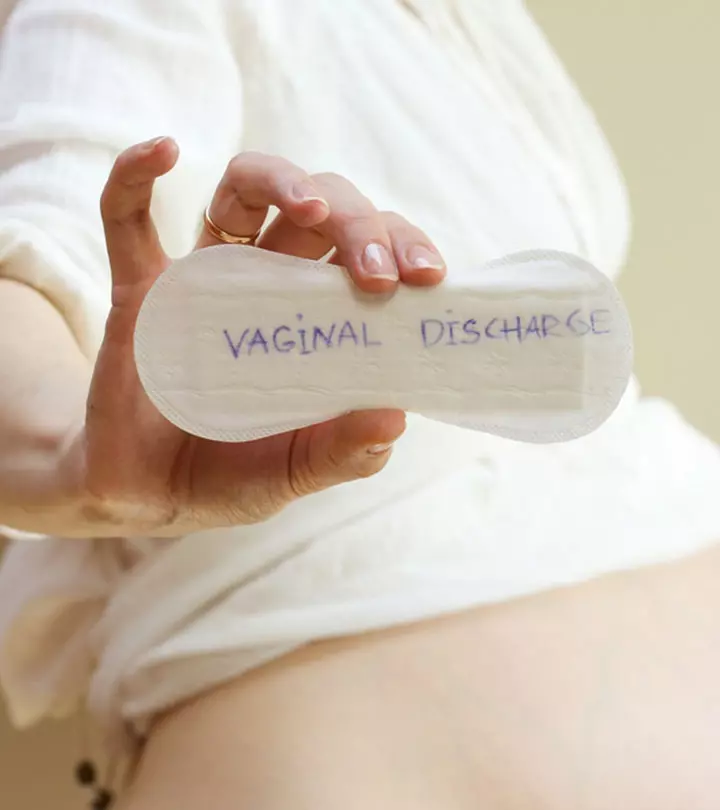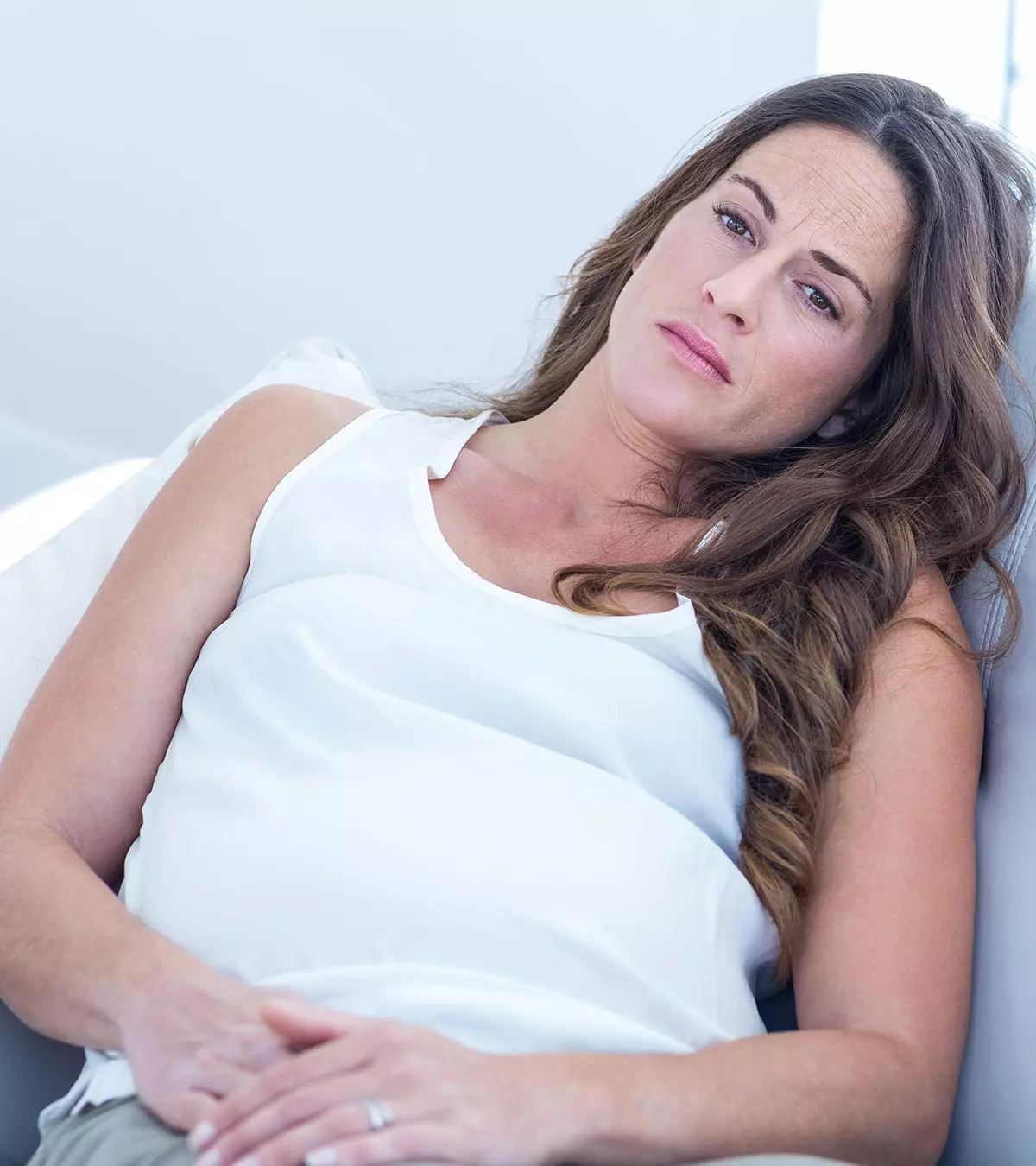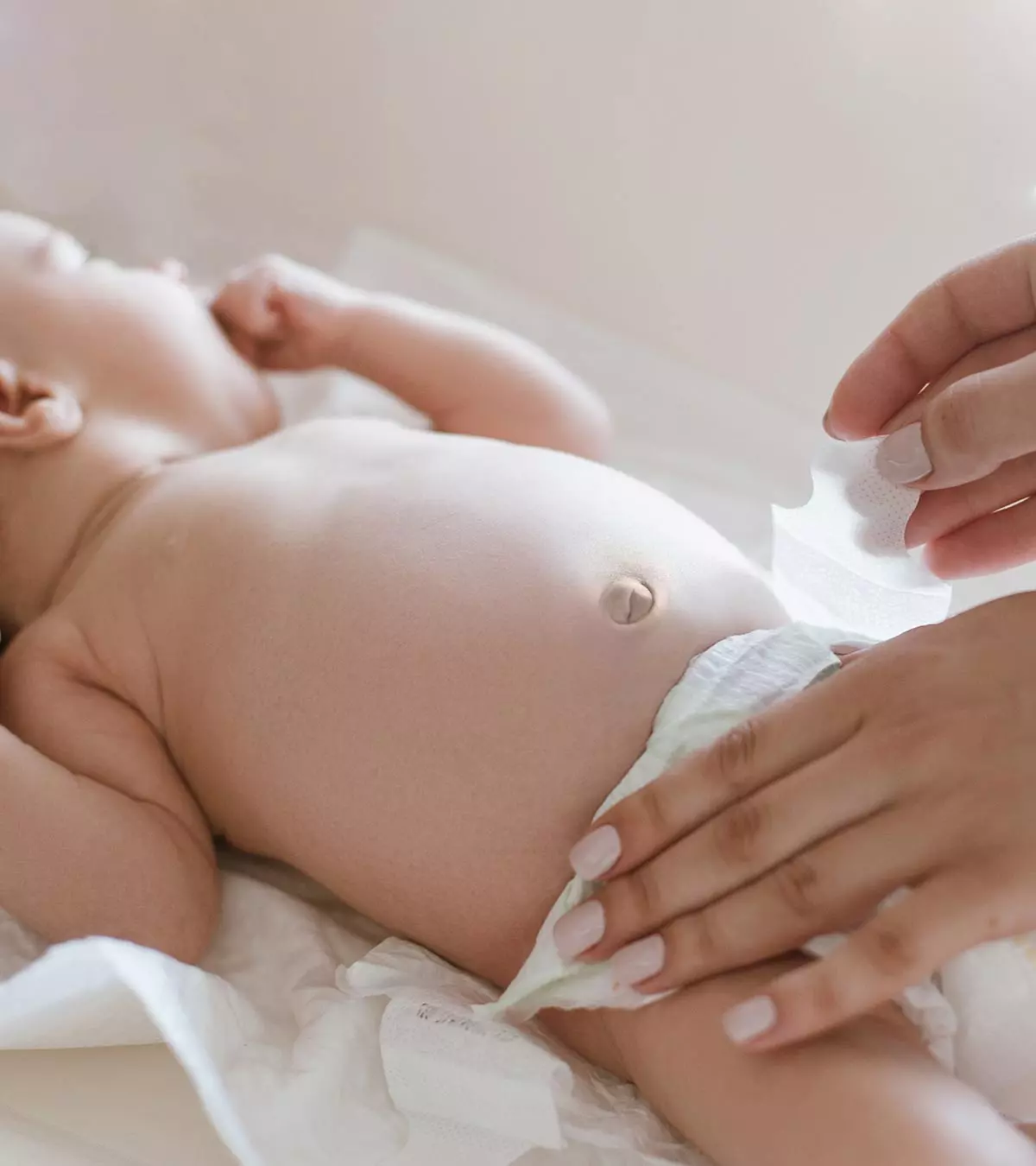
Image: Shutterstock
Parents will invariably notice the color of the baby’s poop when changing the diapers. There could be instances when you may notice an unusual color, such as greenish poop in infants. Changes in the baby’s stool color may often reflect the infant’s health. In this post, we tell you the causes, treatments, prevention, and how to stop green poop in babies.

Key Pointers
- Passing green poop is normal for healthy, well-growing babies and doesn’t need medical intervention.
- Consulting a doctor is necessary if green poop in babies accompanies symptoms, such as excessive gas and reduced appetite.
- Food passing through the intestine quickly, infection, food allergy, and lactose intolerance are a few possible reasons for green stools.
- In most cases, dietary and lifestyle changes can help prevent green poop in babies.
Is It Normal For Breastfed Babies To Have Green Poop?

Greenish poop in infants may not be a matter of concern if your baby is growing and gaining weight optimally. A breastfed baby’s poop is usually mustard yellow, green, or brown in color. Newborns have green, brown, or black tar-like stool known as “meconium” (1).
 Quick fact
Quick factSigns of a healthy bowel movement in breastfed infants are a seedy or pasty stool with loose consistency, similar to that of diarrhea (2).
When To See A Doctor?

You need not consult a doctor each time your baby excretes green poop. However, if the following symptoms accompany greenish poop in infants, then you should promptly see a doctor (14).
- Excessive gas
- Irritability
- Slow growth
- Diarrhea
- Dehydration
- Vomiting
- Reduced appetite
Dr. Leah Alexander, MD, FAAP, a board-certified Pediatrician in New Jersey, advises, “Green stool in infants is usually not a cause for concern. However, if your baby has diarrhea or appears in pain, it’s best to contact your doctor. They can help you determine if there is a cause for concern.“
What Causes Green Poop In Babies?
Greenish poop in infants can be alarming but is not always a cause of concern. The following are the various reasons why a baby could have green stools.
- When the food passes through intestines quickly, the bileiAn alkaline fluid secreted by the liver to help digestion in the food is not absorbed back into the body. It might occasionally happen in babies since their digestive system is still developing. Dark green stool is usually caused due to bile juices (15).
- Newborns who receive phototherapyiA course of treatment that uses light to cure physical or mental illness for neonatal jaundiceiA medical condition arising from excessive bilirubin in the body that causes the yellowing of skin or eyes might have green poop as the excess bile is excreted through the stool (3).
- Problems with infant digestion can cause the baby to become gassy and cranky. If they cry after breastfeeding, they might be lactose intolerant. Lactose intolerance can lead to a foamy or frothy green stool, along with diarrhea (4). This can happen when the baby receives more foremilkiThe milk at the beginning of the feeding , which is rich in lactose.
- Some viral infections of the stomach, such as rotavirus infections, may also cause diarrhea and green stool (5).
- A breastfed baby might have green stools if they are allergic to some foods eaten by the mother. Allergies are usually accompanied by some form of skin reaction as well (6).
- Formula feeding is relatively a common cause of green stools in infants. However, the symptom is not exclusive to formula-fed babies and may occur in breastfed infants too (7).
- If a mother eats a diet rich in leafy greens like spinach, then the baby might pass green stool. If a baby on solids is given pureed spinach or peas, then there are high chances for the baby to have green stools (8).
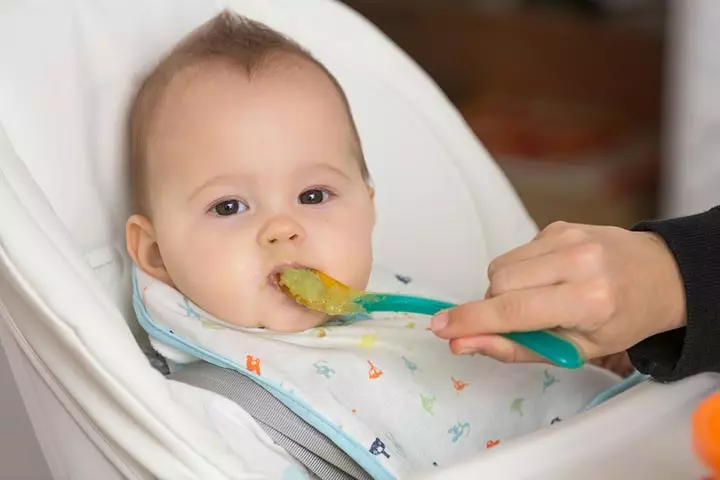
- Babies on iron supplements might also pass green stools (9). Some baby formulas are fortified by iron, and babies on such formulas might also have a green stool.
Sharing her experience, Xia, a mom and author of the blog Momfrinedly, writes, “Today, after two days of no poop, she had a full diaper of pasty green poop. I was immediately concerned because, since we started her on formula, her poop was that cottage cheesy yellow… When I looked up what other moms were experiencing in terms of pasty green poop, I found that everyone was commenting that when formula-fed babies have a pasty green stool, it means that they are getting a lot of iron from the formula (i).”
- An insufficient diet may also cause green stool in babies.
- It is believed that foremilk and hindmilk imbalance may cause green stool. Foremilk is the low-fat lactose-rich breast milk that is produced first when the baby begins feeding. HindmilkiThe milk at the end of the feeding is the high-fat milk produced later during the breastfeeding session. Fat prevents the breast milk from passing quickly through the intestines. A baby might not get sufficient fat if the mother switches the baby from one breast to another, too soon. The baby will receive more foremilk, and it can cause the milk to pass through the intestines quickly along with bile juice, thus causing green stools (10).
- This condition can happen even when the mother produces excess foremilk, which can cause the baby to experience lactose overload, another cause for green stools (16).
Some people believe that teething might cause green stool in babies. However, there is not enough research-based evidence to prove the same.
Treatment For Green Stool In Infants

If the baby is eating well, has no diarrhea, and has overall good health, then there is seldom any treatment required. The doctor will perform a thorough examination and take a detailed history of the baby before suggesting any treatment. Some of the treatment options are:
- Breastfeeding is the best form of nutrition for a baby. The doctor might recommend exclusive breastfeeding (if possible) for babies when the formula is the suspected cause of green stools. If breastfeeding is not possible due to various reasons, they might suggest a change in the formula.
- If the baby has green stools due to medical conditions such as diarrhea and infection, then the doctor may prescribe some medications (5).
- A few research studies claim that prebiotics may help in treating green stools and improving stool consistency by altering gut microbiome composition and promoting intestinal health (11). Do not give any prebiotics to your baby without consulting the doctor.
- If lactose intolerance is the cause, then the baby can consume low lactose or a lactose-free formula. It might even help improve weight gain in babies with diarrhea caused by secondary lactose intolerance (4), following an episode of infectious diarrhea.
- If the doctor suspects a food allergy, then the mother will have to keep a watch on the change in the baby’s poop color and texture. Making a note of the food you eat and then correlating it with the altered poop color of the baby might help in identifying the allergen and avoiding it. Some common allergens are eggs, nuts, dairy products, wheat, fish, soy products, and corn (6).
- If you feel that your baby is getting inadequate feed or have any issues with breastfeeding, then the doctor might refer you to a lactation consultant.
 Quick tip
Quick tipHow To Prevent Green Stool In Babies?
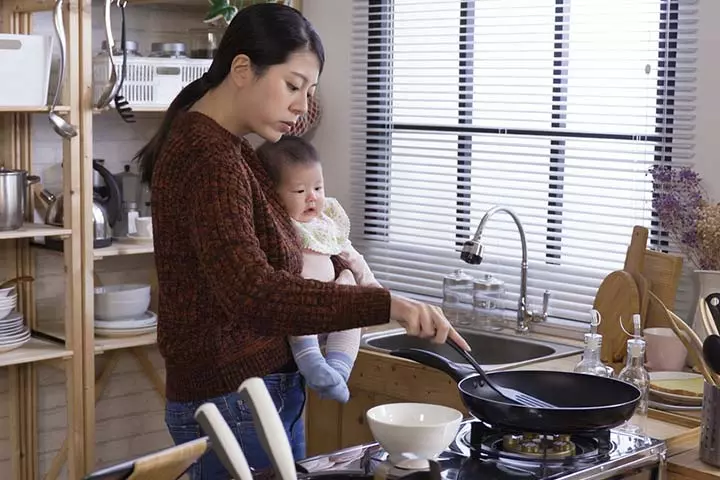
The prevention of greenish poop in infants depends on the cause. There is no need to work on prevention if the baby is passing green poop due to the consumption of green leafy vegetables or iron supplements. But you might need to take preventive measures for the following conditions.
- If an allergen is found to be responsible for green poop, identify and avoid it.
- If cow’s milk is the reason, then the breastfeeding mother may avoid it. If the baby is drinking cow’s milk, stop for a few days, and check.
- If the problem continues despite changing the formula, read the instructions on how to mix the formula before giving it to your baby.
Xia reflects on how adjusting the way she mixed the formula caused a change in her daughter’s stool color. She says, “After trying what other moms said online about flaking the formula with a fork or butter knife and paying attention to the directions on the tub, which say “unpacked scoop,” Emma’s poop has returned to the yellow cottage cheesy form after two weeks (about 5-6 poopy diapers). We also switched back to Enfamil Infant Premium 0-12 months, mostly because Emma liked it better (ii).”
- An elimination food chart might help in identifying the allergen. Note down the food that the breastfeeding mother or the baby has and correlate the food item with green poop.
- Keeping a food diary to track dietary intake and influences helps note any changes in behavior or feeding patterns. It can help consult a pediatrician for any concerns about stool composition and color changes.
- Maintain good hygiene while serving solids to a baby older than six months of age. It can help prevent the spread of gastrointestinal infections, which may cause green stools.
Frequently Asked Questions
1. Is green poop a sign of infection in babies?
Green poop is not always a sign of infection. But certain viral infections such as rotavirus might cause greenish poop in infants. Your doctor can diagnose the cause of infection.
2. Is green poop normal in formula-fed babies?
Green poop is not noticed in all formula-fed babies. However, some studies show that green poop is more common in formula-fed babies than in breastfed babies.
3. Should I change the formula if baby poop is green?
A baby consuming iron-fortified formula may pass green poop. In such cases, there’s no need to change the baby formula. However, if green poop in formula-fed babies occurs due to lactose intolerance, parents should switch to a low-lactose or lactose-free formula.
4. Is green poop normal when switching formulas?
Generally, switching formula doesn’t cause green poop in babies. However, if you switch from a non-iron to iron-fortified formula, the baby may pass green stool.
Greenish poop in infants is usually not a cause for concern if the baby is otherwise healthy and happy. It takes time for a baby’s digestive system to mature, which may cause more bile in the stools, giving it a greenish appearance. If the nursing mother or the baby eats more green leafy vegetables or the baby gets more lactose-rich foremilk, it may contribute to the change in color. Consult a pediatrician if you observe signs of an upset stomach or suspect a food allergy.
Infographics: What Foods Cause Green Poop In Babies?
Green poop color may alarm parents and cause them to worry about the baby having caught some illness. But green poop may occur due to many non-pathological reasons as well. Save this infographic to identify the foods that may cause green poop in babies.
Some thing wrong with infographic shortcode. please verify shortcode syntax
Personal Experience: Sources
MomJunction articles include first-hand experiences to provide you with better insights through real-life narratives. Here are the sources of personal accounts referenced in this article.
i. OPD (Obsessive Poop Disorder);https://momfriendly.wordpress.com/2011/08/04/opd-obsessive-poop-disorder/
ii. Poop Goes Back to Normal;
https://momfriendly.wordpress.com/2011/08/18/poop-goes-back-to-normal/
References
1. Christy L. Skelly, Hassam Zulfiqar, and Senthilkumar Sankararaman, Meconium; The National Center for Biotechnology Information
2. Bowel Movements in Babies; University of Michigan Health
3. Your Baby, Jaundice, and Phototherapy; University of Michigan
4. Gaurav Sethia, Srinivas Sankaranarayananb, andManpreet Sukhia, Low lactose in the nutritional management of diarrhea: Case reports from India; Journal of Clinical Epidemiology and Global Health
5. Frequently Asked Questions About Rotavirus; National Foundation for Infectious Diseases
6. Diet for Breastfeeding Mothers; Children’s Hospital of Philadelphia
7. den Hertog J et al., The defecation pattern of healthy term infants up to the age of 3 months; U.S. National Library of Medicine
8. Stools – Unusual Color; Seattle Children’s
9. Ekhard E Ziegler, Steven E Nelson, and Janice M Jeter, Iron supplementation of breastfed infants from an early age; The American Journal of Clinical Nutrition
10. Lactose overload in babies; Australian Breastfeeding Association
11. Changes in Infants Faecal Characteristics and Microbiota by Inulin Supplementation;. Journal of Clinical Biochemistry And Nutrition
12. Stools – Unusual Color; American Academy of Pediatrics
13. Treating Dehydration with Electrolyte Solution; American Academy of Pediatrics
14. Poos and wees; Pregnancy, Birth and Baby
15. Green Poop Meaning: 6 Possible Causes; Narayana Hrudayalaya
16. Foremilk and Hindmilk; La Leche League International
Community Experiences
Join the conversation and become a part of our nurturing community! Share your stories, experiences, and insights to connect with fellow parents.
Read full bio of Dr. Preeti Gangan
- Dr. Leah Alexander is a board-certified pediatrician who provides medical care in an outpatient setting in Fair Lawn, New Jersey. She has also been working as a pediatrician with Medical Doctors Associates at Pediatricare Associates, New Jersey, since 2005. Dr. Alexander holds a bachelor's degree in Health Science from Kalamazoo College and a Doctor of Medicine degree from Michigan State University.
 Dr. Leah Alexander is a board-certified pediatrician who provides medical care in an outpatient setting in Fair Lawn, New Jersey. She has also been working as a pediatrician with Medical Doctors Associates at Pediatricare Associates, New Jersey, since 2005. Dr. Alexander holds a bachelor's degree in Health Science from Kalamazoo College and a Doctor of Medicine degree from Michigan State University.
Dr. Leah Alexander is a board-certified pediatrician who provides medical care in an outpatient setting in Fair Lawn, New Jersey. She has also been working as a pediatrician with Medical Doctors Associates at Pediatricare Associates, New Jersey, since 2005. Dr. Alexander holds a bachelor's degree in Health Science from Kalamazoo College and a Doctor of Medicine degree from Michigan State University.
Read full bio of Dr. Ritika Shah
Read full bio of Rohit Garoo
Read full bio of Ghazia Shah






